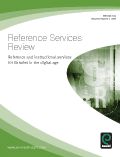
REFERENCE SERVICES REVIEW
Scope & Guideline
Uncovering trends that shape the future of library sciences.
Introduction
Aims and Scopes
- Innovative Library Practices:
The journal explores new methodologies and practices in library reference services, including the implementation of technology and unique instructional strategies that enhance user engagement. - Inclusivity in Library Services:
A significant focus is on creating inclusive library environments and services, addressing the needs of diverse populations, including marginalized and underrepresented groups. - Impact of Technology on Reference Services:
The journal examines how technological advancements, such as virtual reference systems and chatbots, are transforming traditional reference practices and enhancing accessibility. - Research and Evaluation:
There is a strong emphasis on research studies that evaluate the effectiveness of library services, instructional practices, and user experiences, providing evidence-based insights for improvement. - Professional Development and Training:
The journal highlights the importance of ongoing professional development for librarians, focusing on strategies for training staff to better meet user needs and adapt to changing environments.
Trending and Emerging
- Universal Design for Learning (UDL):
There is a growing emphasis on UDL principles in library services and instruction, aiming to create more accessible and inclusive learning environments for all users. - Peer-Led Library Services:
The trend of incorporating peer-led initiatives in library services is gaining traction, focusing on the benefits of peer interaction and support in enhancing user engagement and learning outcomes. - Trauma-Informed Librarianship:
Recognition of the importance of trauma-informed approaches in library services is emerging, highlighting the need for sensitivity and awareness in supporting users with diverse backgrounds and experiences. - Community-Centric Library Practices:
Increasingly, libraries are focusing on community engagement and responsiveness, with research highlighting the importance of aligning library services with the specific needs of local populations. - Diversity, Equity, Inclusion, and Accessibility (DEIA) Initiatives:
There is a significant uptick in discussions surrounding DEIA initiatives within libraries, reflecting a commitment to fostering equitable and inclusive environments for all library users.
Declining or Waning
- Traditional Reference Desk Usage:
There has been a noticeable decrease in discussions surrounding the traditional reference desk model, as libraries increasingly explore alternative service delivery methods like virtual reference. - Print Collection Management:
Although still relevant, the emphasis on managing physical print collections appears to be waning as more libraries focus on digital resources and the rightsizing of collections to better align with user needs. - Conventional Information Literacy Frameworks:
The journal's focus on traditional information literacy frameworks is declining, with a shift towards more dynamic, inclusive, and user-centered approaches to information literacy. - Static Library Services:
There is a diminishing interest in static, one-size-fits-all library services as the literature increasingly emphasizes tailored, responsive services that adapt to the unique contexts of diverse user groups. - Disciplinary-Specific Reference Services:
Discussions that are narrowly focused on disciplinary-specific reference services are decreasing, with a broader trend towards interdisciplinary and holistic approaches in library services.
Similar Journals
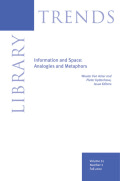
LIBRARY TRENDS
Innovating Practices for a Digital AgeLIBRARY TRENDS is a leading academic journal published by Johns Hopkins University Press, dedicated to the field of Library and Information Sciences. With an established history spanning from 1980 to 2023, this peer-reviewed journal provides a platform for insightful research, innovative practices, and critical analysis addressing contemporary issues in library science. While it holds a respectable Q3 quartile ranking within its category, it ranks #145 out of 280 in Scopus, indicating its significance in the academic community. With an impact factor that reflects the growing importance of the field, LIBRARY TRENDS invites contributions that encompass a wide range of topics, including digital libraries, information technology, and user studies. Although it is not an open-access journal, the content it provides is invaluable for researchers, professionals, and students seeking to enhance their understanding and improve their practices in the rapidly evolving landscape of library and information science. Discover more by exploring the latest issues and join the vibrant discourse shaping our information ecosystems.

LIBRARY JOURNAL
Transforming Information Landscapes TogetherLIBRARY JOURNAL, published by REED BUSINESS INFORMATION, is a vital periodical in the field of Library and Information Sciences, providing a rich resource for researchers, professionals, and students alike. With a history spanning from 1945 to its recent issues, this journal captures the evolving landscape of library science, offering insightful articles that address current trends, practices, and challenges within the profession. Although not an open access journal, LIBRARY JOURNAL is highly regarded for its content, which reflects the challenges faced by libraries and the critical role they play in education and community services. Despite its Scopus ranking of 159 out of 210, the journal continues to contribute significantly to discussions around information management, bibliometrics, and digital libraries, making it an essential read for those invested in the ongoing development of library services and information literacy in the digital age.

Nauchnye i Tekhnicheskie Biblioteki-Scientific and Technical Libraries
Fostering Scholarly Communication in a Digital AgeNauchnye i Tekhnicheskie Biblioteki-Scientific and Technical Libraries is a vital resource in the field of library and information science, particularly focusing on the integration of scientific and technical knowledge within library services. Published by the Russian National Public Library Science & Technology, this journal serves as a platform for researchers, professionals, and students to explore innovative approaches in library management, information dissemination, and technological advancements that shape the future of scientific libraries. With the ISSN 0130-9765, the journal aims to promote scholarly communication and provide insights into the latest trends and methodologies in the realm of scientific and technical libraries. Though currently not designated as an open-access journal, its content is an important contribution to the body of literature that supports the evolution of library services in the fast-paced information age. Located in Moscow, Russia, the journal embodies a commitment to enhancing the scientific community's access to quality library resources, thereby fostering a culture of knowledge sharing and continual professional development.

African Journal of Library Archives and Information Science
Connecting Scholars, Inspiring Solutions.The African Journal of Library Archives and Information Science (ISSN: 0795-4778; E-ISSN: 0795-4778) is a pivotal publication in the field of Library and Information Sciences, published by ARCHLIB & INFORMATION SERVICES LTD in Nigeria. With a focus on the diverse and evolving challenges faced by libraries and information professionals in the African context, this journal serves as a platform for scholarly communication, fostering innovation and collaboration among researchers, practitioners, and academics. The journal has a notable impact factor, reflected in its Q3 ranking within the category for 2023, and is indexed in Scopus, holding a percentile rank of 22nd in its field, further validating its relevance and scholarly contribution. Running since 2008 with continual publications through to 2024, the journal aims to advance knowledge, share best practices, and highlight emerging trends in librarianship and information science across Africa and beyond. By offering open access options, it ensures wide dissemination of knowledge, making it an essential resource for those dedicated to enhancing information services and archives.

LIBRARY AND INFORMATION SCIENCE
Championing knowledge for a digitally informed society.LIBRARY AND INFORMATION SCIENCE is a specialized academic journal dedicated to the advancement of knowledge and scholarship in the field of library and information sciences. Published by MITA SOC LIBRARY INFORMATION SCIENCE, this esteemed journal has been a crucial platform for scholarly communication since 1980, addressing the dynamic challenges and developments in the information landscape. Although it holds a Q4 category ranking in the Library and Information Sciences according to the 2023 Scopus Ranking, the journal serves a unique niche, providing insights and fostering discussions among a diverse audience of researchers, professionals, and students. With no Open Access options currently available, its valuable research contributions are accessible through institutional subscriptions and library access. The journal aims to disseminate innovative research, case studies, and theoretical explorations that enhance our understanding of information behavior, retrieval systems, library management, and emerging technologies, thus promoting an informed society in an increasingly digital world. Given its focused scope and enduring presence, LIBRARY AND INFORMATION SCIENCE continues to be an essential resource for anyone invested in the future of libraries and information services.

Qualitative & Quantitative Methods in Libraries
Exploring Innovative Insights in Library MethodologiesQualitative & Quantitative Methods in Libraries is an essential journal in the field of library and information science, published by the esteemed International Society for Art, Science and Technology (ISAST). With its ISSN 2241-1925, the journal focuses on the application of both qualitative and quantitative research methodologies in the realm of library studies, offering insights that are crucial for advancing practices and policies within the sector. Although it currently does not offer open access, its rigorously peer-reviewed articles ensure high-quality contributions that cater to researchers, practitioners, and students alike. This journal is committed to fostering innovative research that bridges theory with practice, making it a vital resource for anyone looking to enhance their understanding and application of research methods in library science. With its base in Athina, Greece, it serves as an international platform for scholarly exchange, contributing to the global discourse in the field.
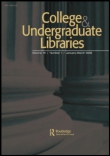
College & Undergraduate Libraries
Empowering Academic Excellence Through Innovative Library Practices.College & Undergraduate Libraries is an esteemed journal published by ROUTLEDGE JOURNALS, TAYLOR & FRANCIS LTD, focusing on the advancement of library services tailored for college and undergraduate institutions. With an ISSN of 1069-1316 and an E-ISSN of 1545-2530, this journal serves as a crucial platform for researchers, educators, and practitioners to disseminate innovative practices, empirical studies, and theoretical frameworks related to education and library science. Showcasing a commitment to excellence, it ranks in the Q2 category in Library and Information Sciences and Q3 in Education and E-learning as of 2023, according to the Scopus metrics. The journal spans a rich history from 1994 to 2004 and has continued to provide valuable insights from 2006 to the present, making it a vital resource for those aiming to enhance undergraduate library experiences. While it is not an open access publication, its contents can be accessed through institutional subscriptions, ensuring that it reaches a wide audience. By contributing to the dialogue surrounding the future of academic libraries, College & Undergraduate Libraries stands as a key resource in shaping the landscape of library services and education.

Investigacion Bibliotecologica
Pioneering Research for the Evolving World of LibrariesInvestigacion Bibliotecologica, published by the National Autonomous University of Mexico, stands as a vital resource in the field of library and information sciences. With a legacy of open access publishing since 1986, this journal endeavors to disseminate high-quality research which aims to advance knowledge and practices within the library and information sector. With an ISSN of 0187-358X and E-ISSN 2448-8321, it has secured its position in the competitive landscape of scholarly communication, earning a commendable Q3 ranking in its category as of 2023. The journal's influence is reflected in its Scopus ranking within the library and information sciences field, where it ranks #151 among 280 journals. Located in Mexico City, it provides scholars, professionals, and students with open access to its content, facilitating knowledge sharing and academic collaboration. As it continues its publication journey from 2008 to 2024, Investigacion Bibliotecologica remains an essential platform for innovative inquiries, practical insights, and the latest developments in library science.
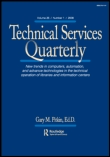
Technical Services Quarterly
Exploring the intersection of technology and information services.Technical Services Quarterly, published by Routledge Journals, Taylor & Francis Ltd, is a critical platform for the dissemination of scholarly research in the fields of Library and Information Sciences as well as Computer Science Applications. With an established history dating back to 1984, this journal has fostered a vibrant academic community and continues to thrive with a robust publication strategy aimed at enhancing technical services in libraries. As a Q3-ranked journal in Computer Science Applications and Q2 in Library and Information Sciences for 2023, it provides a compelling opportunity for researchers and professionals to contribute to and engage with cutting-edge developments in these disciplines. While currently not an open-access journal, Technical Services Quarterly ensures that its content remains relevant and impactful by maintaining rigorous peer-review standards and a commitment to scholarly excellence. With a focus on practice-oriented research and empirical studies, it encourages contributions that further the understanding of evolving technologies and their applications within the library sector, making it an essential read for academics and practitioners alike.
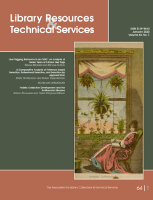
LIBRARY RESOURCES & TECHNICAL SERVICES
Connecting Ideas, Resources, and Services in Library ScienceLIBRARY RESOURCES & TECHNICAL SERVICES, published by the American Library Association, is an esteemed journal dedicated to advancing the fields of library science and information technology. With an ISSN of 0024-2527 and E-ISSN 2159-9610, this journal has been a vital resource since its inception in 1978, converging years and evolving to remain relevant through to 2024. Recognized for its academic rigor, it currently holds a Q3 ranking in Information Systems and a Q2 ranking in Library and Information Sciences, showcasing its contribution to growing knowledge in these crucial areas. Although not an Open Access journal, LIBRARY RESOURCES & TECHNICAL SERVICES provides a platform for innovative research, case studies, and discussions that are critical for researchers, library professionals, and students alike. With a commitment to fostering professional development and sharing best practices, the journal serves as a crucial repository of information that aids in the advancement of library resources and technical services.